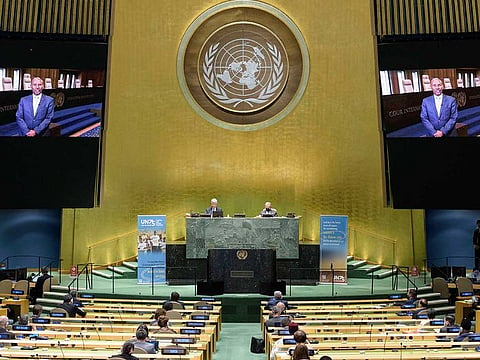A critical turning point for the UN at 75
The multilateral body has robust experience in dealing with major global challenges

If humanity has learnt anything from the past ten months, it would be both the importance of multilateralism and the detrimental effects that nationalism can have on the inner workings of a modern world. The pandemic revealed the many manifestations of nationalism, and how an isolated approach among nations has harmful consequences such as limiting the exchange of people and goods, the disruption of key industries such as tourism, as well as the collapse of the global supply chain.
According to the Pew Research Center, 91 per cent of the world’s population now lives in countries that restrict the arrival of passengers from other countries. Similarly, according to the United Nations Conference on Trade and Development (UNCTAD), there will be a 27 per cent decline in global trade in the second quarter of 2020, marking a significant downturn from the previous three months. As each country locks its border to fight the virus, a resurgence in nationalism is leading us toward an uncertain social, economic, and political future. Any gains made before the pandemic have radically plateaued or disappeared. Generally, it feels like we are stumbling in the dark.
We cannot address multilateralism without mentioning the United Nations, which marked its 75th anniversary just this past September. Seven decades have passed since a Charter signed by Britain, China and the United States established the United Nations in June of 1945. The United Nations rose from the ashes of the Second World War to establish world peace and security as its guiding principles.
The United Nations has 75 years of robust experience dealing with global challenges such as poverty, hunger, and environmental disaster, all while navigating conflicts across regions from Africa to Asia, to the Middle East

Today, with 193 member nations taking part in this global organisation, it has achieved its purpose in stopping war and preventing other world powers from pounding the war drum. However, in the face of the swift-moving COVID-19 virus, the United Nations must reinvent itself, adjusting its purpose and principles to be relevant in a post-pandemic world. It must aspire to both establish global security and find new ways to protect the environment, an unequivocal necessity and a burgeoning interest of many world leaders.
Do everything in our power
World leaders expressed their concerns at the 75th General Assembly high-level meeting, which was unique as all convened via pre-recorded videos addressing the wider international community as well as domestic audiences. One of the more profound remarks was made by German Chancellor Angela Merkel, who stressed “The United Nations can be only as effective as its members are united.” She urged renewed efforts on the part of leaders “to do everything in our power” to find common responses.
Another call to action was made by the President of Seychelles, Danny Faure, who highlighted alarming issues such as climate change that know no borders. He elaborated “I assure you that the smallest, poorest and weakest of nations can contribute ideas as innovative ... as the biggest, wealthiest and most powerful countries.”
Also Read: How diplomacy can help in economic recovery
As the United Nations faced reconfiguration, seeking to embed agile and innovative systems, we must acknowledge the following:
First, the world is unprepared to not have the United Nations as one of the leading and prominent international organisations in modern history. It has been a leading platform to provide help to the most vulnerable, almost 60 million worldwide, by addressing climate change issues and displaced populations. We must admit the success of the Non-Proliferation Treaty, which prevented many countries from obtaining deadly nuclear weapons.
Second, some may say that the United Nation remains stuck in 1945, especially with France and the UK remaining permanent members of the Security Council, while there is only one permanent representative from Asia (China) and no permanent representative from the Middle East (considered to be an unstable region) and Latin America.
Lastly, and most importantly, is the budget contribution by all state members. Countries with a higher percentage of budget contribution can determine and influence aid based upon their national interests. This will be more challenging in the post-COVID world, as most countries are reducing their budgets, which will pose an alarming obstacle for the United Nations to continue its operations.
The United Nations has 75 years of robust experience dealing with global challenges such as poverty, hunger, and environmental disaster, all while navigating conflicts across regions from Africa to Asia, to the Middle East. The United Nations is at a critical turning point and will likely face a shortage of breath when it comes times to blowing out its 76 candles.
Ruqayya Alblooshi is an Emirati columnist and researcher in the field International Relations







